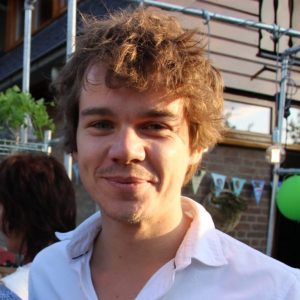 Bart Franx
Bart Franx
I am a PhD student interested in all things related to neuroscience. My project is a cog in the machine called the CONTRAST program, a collaboration of scientists and healthcare professionals in the Netherlands to improve the outlook of stroke patients (https://www.contrast-consortium.nl). In a nutshell, I investigate pressing questions from clinical practice about the natural history of ischemic stroke, which I model in a preclinical setting and probe using (molecular) MRI techniques. Previous areas of research include neurodegenerative disease and dietary-related cognitive dysfunction.
 Esther van Leeuwen
Esther van Leeuwen
My research project focusses on the inflammatory response after ischemic stroke. I am evaluating the possibility to image neuroinflammation in vivo, caused by an ischemic stroke using advanced molecular imaging techniques. Secondly, I am exploring novel therapeutic endocannabinoids which are hypothesized to target the detrimental parts of the inflammatory response after stroke. In this project we propose to test the hypothesis that specific targeting of immune cells with ligands that modulate the cannabinoid system improves functional recovery by reducing inflammation after stroke. For the development of a novel therapy, a fundamental step is to determine the optimal therapeutic window after ischemic stroke. In this project our aim is to determine the optimal timing of treatment, by visualizing the in vivo inflammatory response after ischemic stroke using magnetic resonance imaging. After establishing the optimal timing for therapy, therapeutic studies will be executed with several promising endocannabinoid therapeutical targets.
 Anu Meerwaldt
Anu Meerwaldt
Ischemic stroke is followed by a robust immune activation observed not only in the brain but also in the hematopoietic organs such as the bone marrow and the spleen. This immune activation has both beneficial and detrimental functions affecting long term recovery of patients. Currently there is no consensus on the optimal therapeutic approach other than it is hypothesized that there is a sweet spot for immune activation after stroke promoting recovery. In my project I am applying immunomodulatory therapeutics targeting peripheral immune system aiming to bring us one step closer of finding the elusive sweet spot. In practice this means applying several methods from molecular imaging to in vitro analyses in preclinical stroke models.
 Vera Wielenga
Vera Wielenga
White matter motor tracts are the highways through which signals from the motor cortex are relayed to other areas in the brain, and down to the spinal cord and the limbs. Stroke can result in loss of motor function, but most patient also show some form of spontaneous recovery, highlighting the brain’s capacity for recovery. However, recovery trajectories in patients vary widely. Damage to motor tracts is a complex problem, and its contribution to the potential for recovery after stroke is incompletely understood. My project focusses on better understanding the cause and consequences of changes to white matter motor tracts after stroke and how this influences functional recovery. In this project, we work with various rodent stroke models. By combining MR imaging, behavioural, cellular and electrophysiological techniques, we aim to obtain a comprehensive view of the recovery processes in white matter motor tracts after stroke.
 Jord Vink
Jord Vink
My fascination with the workings of the human body started in high school. During the course of my undergrad, this fascination was drawn toward the human brain, specifically. Today, as a PhD student, I study the (electro)physiology of the brain in healthy individuals and patients with brain damage (i.e. stroke, epilepsy and oncology) as part of various projects and collaborations. Besides my research, I also work at a startup company. This work provides me with a different perspective on neuroscience, sparking new ideas for my research.